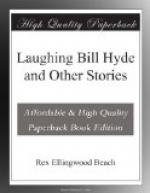At noon he wandered into the park, and, finding a sheltered spot, sunned himself as best he could. He picked up the sheets of a wind-scattered paper and read until the chill December afternoon got into his bones and forced him to his feet. The tale of the unidentified girl at the Morgue recurred to him when he read the announcement that she would be buried two days later in the Potter’s Field. Perhaps the girl had starved for lack of work, he reflected. Perhaps hunger and cold had driven her to her death. Certainly those two were to blame for many a tragedy calculated to mystify warmly clad policemen and well-fed reporters.
When he stole, shivering, into his bleak bedroom, late that night, he found a note pinned upon his pillow. Of course the landlady needed her rent—all landladies were in need of money—and of course he would get out in the morning. He was glad she had not turned him out during the day, for this afforded him sanctuary for another night at least. After to-morrow it would be a park bench for his.
He left his valise behind in the morning, rather lamenting the fact that the old lady could not wear the shirts it contained, and hoping that she would realize a sufficient sum from their sale to pay his bill.
It was late afternoon when he commenced his listless tramp toward the newspaper offices. Since Burns had become his pet aversion, he saved him for the last, framing a few farewell remarks befitting the death of hopes like his, and rehearsing an exit speech suitable to mark his departure from the field of letters.
When he finally reached The Intelligencer editorial-rooms, Burns rounded on him angrily.
“For the love of Mike! Are you here again?” he demanded.
“I thought you might like to have some space work—”
“By heavens! You’re persistent.”
“Yes.”
“We editors are an unfeeling lot, aren’t we?” the fat young man inquired. “No temperament, no appreciation.” He laughed noiselessly.
“Give me a job,” Anderson cried, his voice breaking huskily. “I’ll make good. I’ll do anything.”
“How long do you intend to keep bothering me?” questioned Burns.
Anderson’s cheeks were blue and the backs of his legs were trembling from weakness, but he repeated, stolidly: “Give me a job. I—I won’t bother you after that. I’ll make good, see if I don’t.”
“You think well of yourself, don’t you?”
“If you thought half as well of me as I do,” Paul assured him, “I’d be your star reporter.”
“Star hell!” testily cried the editor. “We haven’t got such a thing. They don’t know they’re alive, except on pay-day. Look at this blond girl at the Morgue—they’ve wasted two weeks on that case.” He paused suddenly, then his soft lips spread, showing his sharp, white teeth. Modifying his tone, he continued: “Say, I rather like you, Anderson, you’re such a blamed nuisance. You’ve half convinced me that you’re a genius.”




